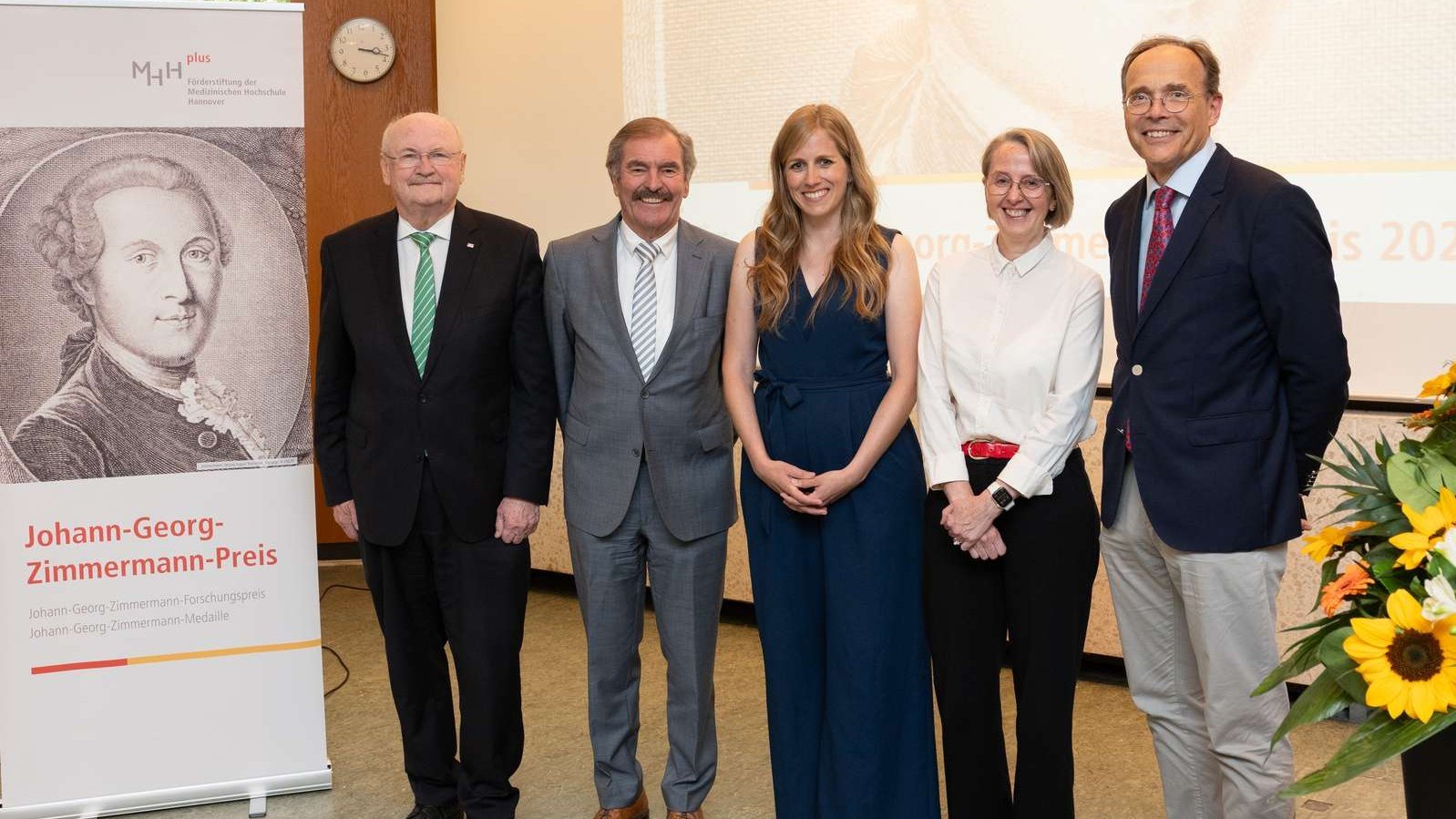The MHH plus Foundation honours Professor Dr Michael Bamberg and Dr Franziska Blaeschke with the Zimmermann Prize and Medal

MHH President Prof Dr Michael Manns, the two prizewinners Prof Dr Michael Bamberg and Dr Franziska Blaeschke and the two laudators Prof Dr Hildegard Büning and Prof Dr Peter Hillemanns (from left). Copyright: Annika Morchner, MHH
The Johann-Georg-Zimmermann Research Prize and the Johann-Georg-Zimmermann Medal are among the highest honours for achievements in cancer research in Germany. The prizes were presented on Thursday, 20 June 2024, at Hannover Medical School (MHH) by Professor Dr Michael Manns together with the Deputy Chairman of the Foundation Board of the Förderstiftung, Prof. Dr Siegfried Piepenbrock. The Johann Georg Zimmermann Prize is financed by the MHH plus Foundation and awarded jointly with the Comprehensive Cancer Centre Lower Saxony (CCC-N).
"The Johann Georg Zimmermann Prize not only recognises the outstanding achievements of the prizewinners, but is also an incentive for all those who have dedicated themselves to cancer research. It honours those who tirelessly dedicate themselves to the fight against the widespread disease of cancer and create new hope and treatment options through their scientific findings," said Lower Saxony's Science Minister Falko Mohrs. "I would like to congratulate Professor Dr Michael Bamberg and Dr Franziska Blaeschke on their award. Their work and excellent research are helping to save lives and improve the quality of life of cancer patients."
The Johann Georg Zimmermann Medal was awarded to Professor Dr Michael Bamberg, former Chief Medical Director and Chairman of the Board of the University Hospital of Tübingen and former Director of the Institute of Radiation Oncology. As President of the German Cancer Society and the German Cancer Congress, the radiation oncologist has had a particular influence on the development of certified structures with organ cancer centres, oncological centres and comprehensive cancer centres in Germany.
Dr Franziska Blaeschke received the Johann-Georg-Zimmermann Research Prize, endowed with 10,000 euros and aimed at young cancer researchers for their current scientific work. The doctor and scientist heads a Leibniz junior research group for paediatric immuno-oncology at the German Cancer Research Centre and Hopp Children's Cancer Centre in Heidelberg and is researching how to improve the immunotherapy of childhood tumours, particularly brain tumours.
"This year, we are honouring Professor Michael Bamberg, an outstanding representative of radiation oncology who has also made a significant contribution to professional policy beyond the region," emphasised MHH President Professor Dr Michael Manns. "And with Dr Franziska Blaeschke, we are honouring a successful researcher who has already made highly regarded contributions to a particularly topical issue in oncology at a very young age at various locations on both sides of the Atlantic: the immunotherapy of tumours with CAR-T cells."
The fight against cancer is his life's work - Professor Dr Michael Bamberg
Today, 60 percent of cancer patients in Germany are treated in certified centres, and it no longer matters whether the treatment takes place in Kiel or Constance. This has a concrete impact on the lives of many patients: higher chances of survival and a better quality of life despite a cancer diagnosis. This success is also thanks to Professor Dr Michael Bamberg. As President of the German Cancer Society from 2004 to 2008, he played a decisive role in advancing the National Cancer Plan and significantly shaped the development of certified organ cancer centres, oncology centres and comprehensive cancer centres. "I am very pleased about this honourable recognition of my medical commitment and clinical research activities," said Professor Bamberg.
At the same time, his pioneering radio-oncological studies have fundamentally shaped the treatment of brain tumours - he was awarded the prestigious German Cancer Prize in 2012 for his achievements in clinical research. As Chairman of the Oncology Guidelines Programme, he also championed the development and use of scientifically based and practicable oncological guidelines. Last but not least, he played a decisive role in establishing radiation oncology as an independent discipline in Germany; the founding of its own specialist society, the German Society of Radiation Oncology, in 1995 was largely due to his efforts.
Professor Bamberg accepted the call to the Department of Radiation Oncology at Tübingen University Hospital in 1988. Just ten years later, he took over the reins of the entire hospital - as Chief Medical Director and Chairman of the Board. In the first few years, he held this position alongside his clinical work as Medical Director of Radiation Oncology; from 2012 to 2023, he held this position full-time.
Using the human immune system to treat cancer - Dr Franziska Blaeschke
Immuno-oncology is now a key pillar of cancer therapy and for many patients it offers the chance of long-term survival with a good quality of life. Dr Franziska Blaeschke, a junior doctor in paediatrics and adolescent medicine, is also driven to further develop this form of therapy. "For many years, I have been fascinated by the idea of using the human immune system to treat cancer. With my research, I would like to contribute to giving children and adolescents with cancer and a poor prognosis a long-term future," said the 36-year-old.
After working at the university hospitals in Tübingen and Munich and a research stay in the USA, Dr Blaeschke is currently setting up a junior research group for paediatric immuno-oncology at the German Cancer Research Centre and Hopp Children's Cancer Centre in Heidelberg. In recent years, CAR-T cells have revolutionised the treatment of haematological cancers - but they have proven to be less effective in most solid tumours. "Together, we aim to decipher immune cell functionality in the context of solid tumours and develop a new generation of immunotherapies for cancer treatment," explained Dr Blaeschke.
Text: Simone Corpus